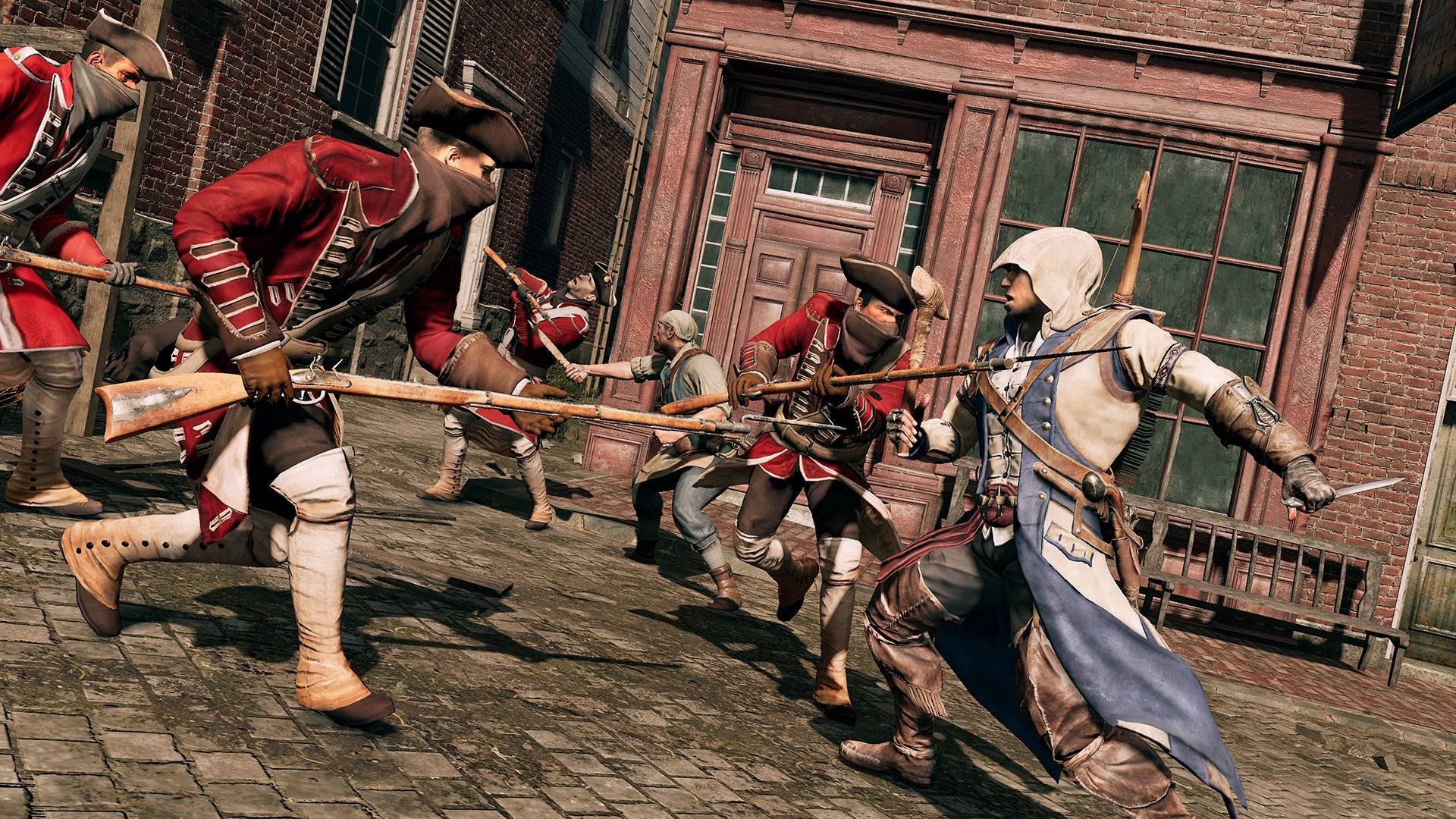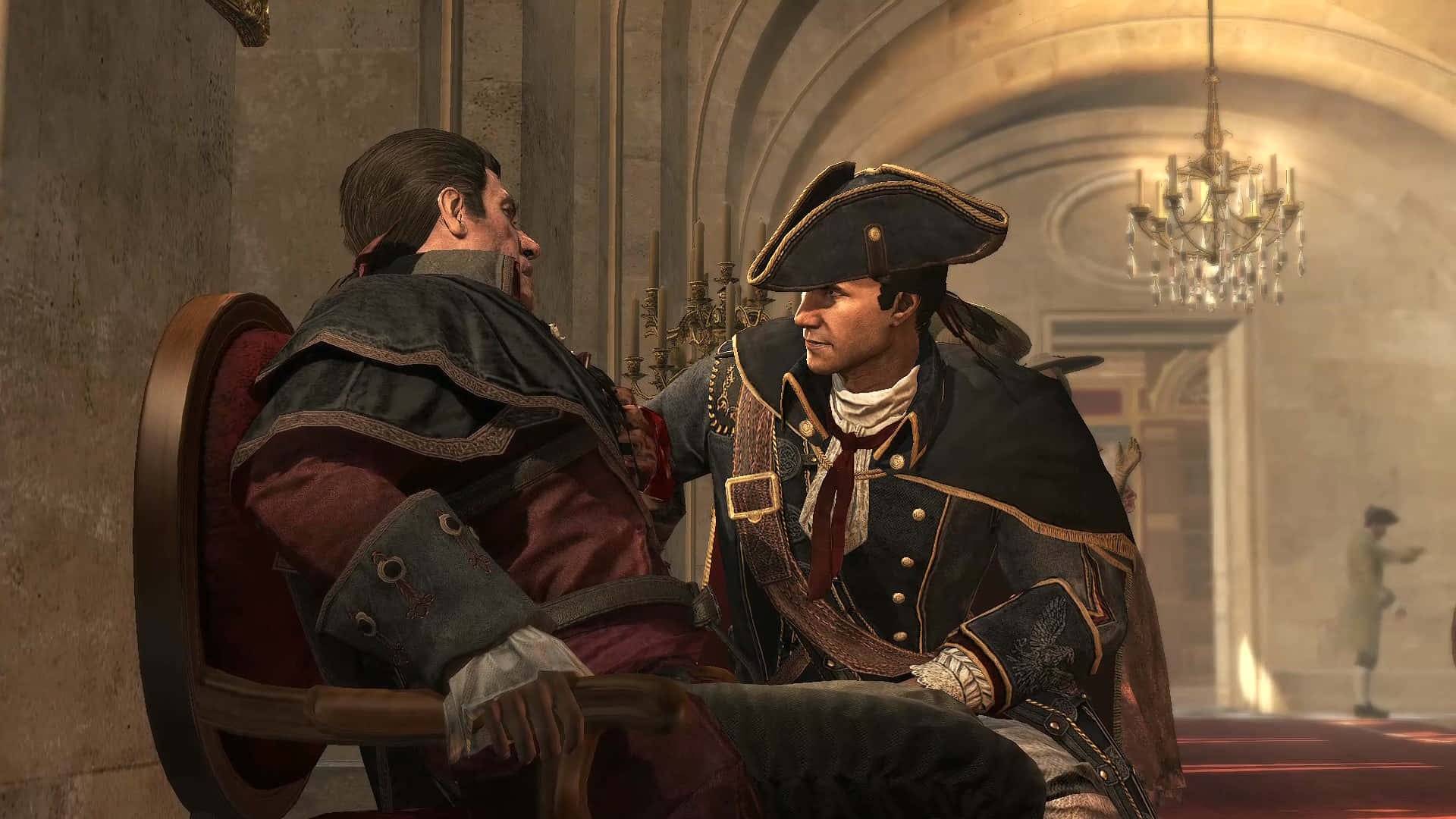by Layla May 20,2025
One of the most iconic moments in the Assassin’s Creed series occurs early in Assassin’s Creed 3, when Haytham Kenway completes his mission to gather a group of what the player initially believes to be assassins in the New World. Haytham, equipped with a hidden blade and displaying the charisma of previous protagonist Ezio Auditore, has been portrayed as a hero up to this point, liberating Native Americans from prison and confronting British redcoats. However, the revelation comes when he utters the Templar phrase, "May the Father of Understanding guide us," making it clear that the player has been following the Templars, the sworn enemies of the Assassins.
To me, this twist epitomizes the pinnacle of Assassin’s Creed’s storytelling potential. The initial game in the series introduced a compelling concept—identifying, understanding, and eliminating targets—but it fell short in delivering a robust narrative, with both protagonist Altaïr and his targets lacking depth. Assassin’s Creed 2 improved upon this by introducing the charismatic Ezio, yet it failed to flesh out his adversaries adequately, as seen with the underdeveloped Cesare Borgia in Assassin’s Creed: Brotherhood. It was not until Assassin’s Creed 3, set against the backdrop of the American Revolution, that Ubisoft dedicated equal effort to developing both the hunter and the hunted. This approach provided a seamless narrative flow from setup to payoff, striking a perfect balance between gameplay and story that has yet to be replicated.
 While the current RPG-focused era of Assassin’s Creed has been generally well-received, there's a consensus among players, critics, and various online discussions that the series is in decline. The reasons for this are debated: some criticize the increasingly fantastical elements like battling mythological figures like Anubis and Fenrir, while others object to the inclusion of varied romance options or the use of real historical figures, such as the African samurai Yasuke in Assassin’s Creed Shadows. However, I believe the decline stems from the series' shift away from character-driven narratives, now overshadowed by the expansive sandbox environments.
While the current RPG-focused era of Assassin’s Creed has been generally well-received, there's a consensus among players, critics, and various online discussions that the series is in decline. The reasons for this are debated: some criticize the increasingly fantastical elements like battling mythological figures like Anubis and Fenrir, while others object to the inclusion of varied romance options or the use of real historical figures, such as the African samurai Yasuke in Assassin’s Creed Shadows. However, I believe the decline stems from the series' shift away from character-driven narratives, now overshadowed by the expansive sandbox environments.
Over time, Assassin’s Creed has expanded its original action-adventure formula by integrating RPG elements such as dialogue trees, XP-based leveling systems, loot boxes, microtransactions, and gear customization. Yet, as these newer installments have grown larger, they've begun to feel less substantial, not only in terms of repetitive side missions but also in their storytelling. While a game like Assassin’s Creed Odyssey boasts more content than Assassin’s Creed 2, much of it feels less polished and immersive. The introduction of player choice in dialogue and actions, while theoretically enhancing immersion, often results in scripts that feel stretched thin, lacking the focused, character-centric storytelling of the series' earlier action-adventure titles.
This shift has led to a noticeable drop in immersion, with interactions often feeling more like dealings with generic NPCs rather than nuanced historical figures. The Xbox 360/PS3 era of Assassin’s Creed, in contrast, delivered some of the most compelling writing in gaming, from Ezio’s impassioned "Do not follow me, or anyone else!" after defeating Savonarola, to the poignant and complex soliloquy delivered by Haytham upon his death at the hands of his son, Connor:
"Don't think I have any intention of caressing your cheek and saying I was wrong. I will not weep and wonder what might have been. I'm sure you understand. Still, I'm proud of you in a way. You have shown great conviction. Strength. Courage. All noble qualities. I should have killed you long ago."
 The quality of writing has also diminished in other aspects. Modern games often simplify the moral dichotomy to Assassins = good and Templars = bad, whereas earlier titles explored the blurred lines between these factions. In Assassin’s Creed 3, each Templar Connor defeats challenges his beliefs, with William Johnson suggesting the Templars could have prevented the Native American genocide, Thomas Hickey questioning the feasibility of the Assassins' goals, and Benjamin Church highlighting the relativity of perspective. Haytham further undermines Connor's trust in George Washington by predicting the future tyranny of the new nation, a prediction reinforced by the revelation that Washington, not Charles Lee, ordered the burning of Connor's village. By the end of the game, players are left with more questions than answers, enhancing the narrative depth.
The quality of writing has also diminished in other aspects. Modern games often simplify the moral dichotomy to Assassins = good and Templars = bad, whereas earlier titles explored the blurred lines between these factions. In Assassin’s Creed 3, each Templar Connor defeats challenges his beliefs, with William Johnson suggesting the Templars could have prevented the Native American genocide, Thomas Hickey questioning the feasibility of the Assassins' goals, and Benjamin Church highlighting the relativity of perspective. Haytham further undermines Connor's trust in George Washington by predicting the future tyranny of the new nation, a prediction reinforced by the revelation that Washington, not Charles Lee, ordered the burning of Connor's village. By the end of the game, players are left with more questions than answers, enhancing the narrative depth.
Reflecting on the series' history, it's evident why a track like "Ezio’s Family" from the Assassin’s Creed 2 soundtrack became the franchise's emblematic theme. The PS3 games, especially Assassin’s Creed 2 and 3, were fundamentally character-driven narratives. The melancholic tones of "Ezio’s Family" were meant to evoke Ezio’s personal loss, not merely the game's setting. While I appreciate the expansive world-building and improved graphics of the latest Assassin’s Creed titles, I hope the series will one day return to its roots, delivering the intimate, focused stories that originally captivated fans. However, in an industry increasingly favoring vast open worlds and live service models, such a return may not align with current market trends.
Zenless Zone Zero Update Cycle Leak Hints at Future Content cadence
All Mavuika Materials, Kit, and Constellations in Genshin Impact
Counterfeit Bank Simulator: Minting Solution for Economic Crises
Marvel Rivals: Season 1 Dracula Explained
Best Xbox Game Pass Games For Kids (January 2025)
Solo Leveling: Global Tournament Draws Near
Power Rangers: Uncover Hidden Secrets in Rita's Carnival and Cemetery
Roblox: Anime Auras RNG Codes (January 2025)

Guess the Word. Word Games
Download
Guild of Spicy Adventures 0.55
Download
Impossible GT Stunt Sports Car
Download
Bar Abierto Caça Niquel
Download
Crossword Islands
Download
My Taco Shop: Food Game
Download
4Play - Mau Binh Online
Download
Word Games: Sex Word Puzzle
Download
VEGA - Game danh bai doi thuong
Download